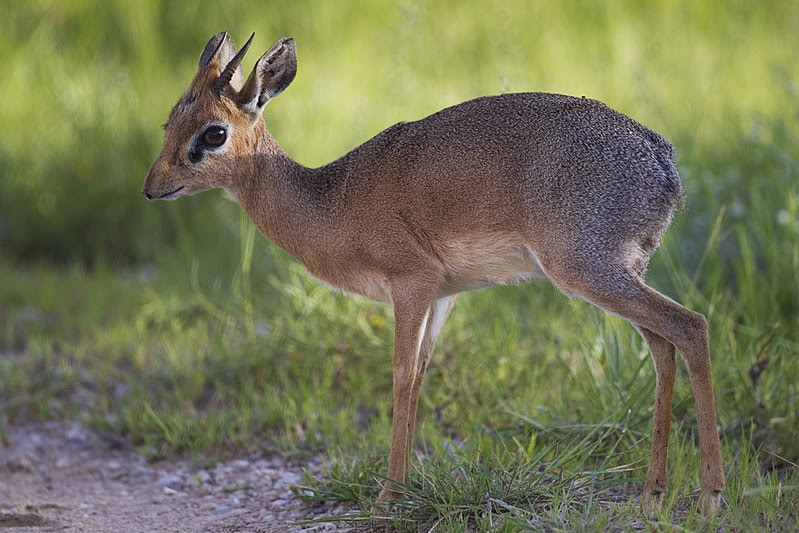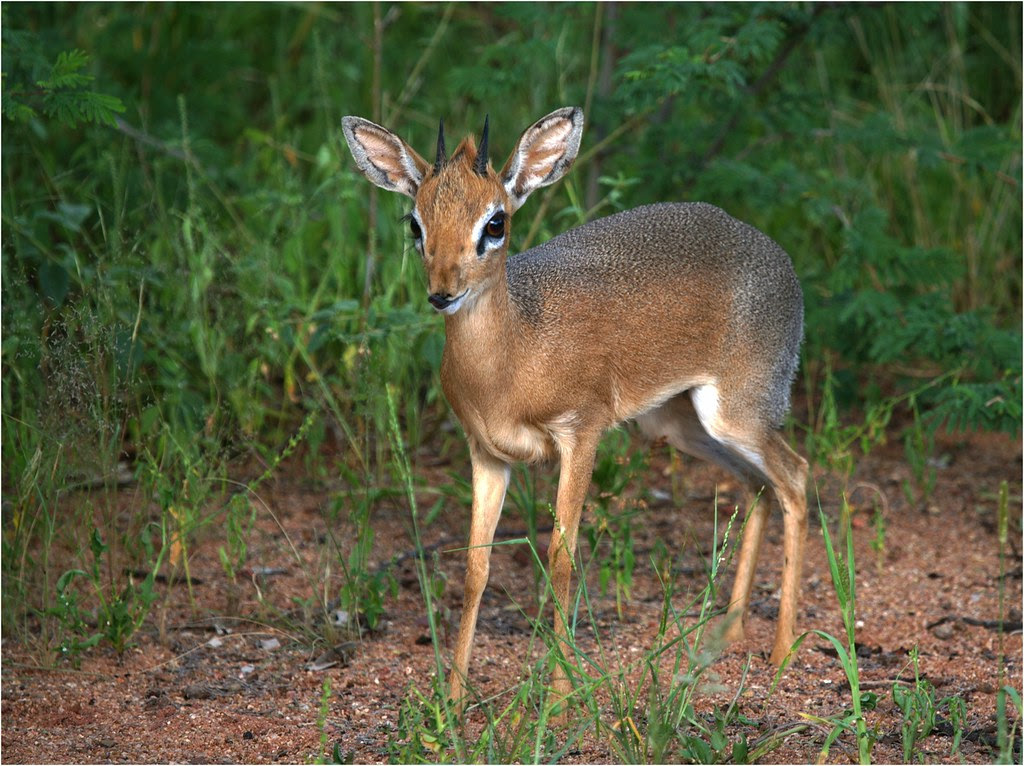.
Damara Dik-Dik (Madoqua kirkii, genus Madoqua), female, in Etosha National Park, Namibia: photo by Yathin S. Krishnappa, 8 February 2012
A movement
Something on the air
a half
mile off
in the bush --
an intruder?
Never not
on the alert --
Who goes there?
startled to flight
the ever vigilant
dik-dik bolts
at the merest
hint
of the presence
of you
a half
mile off
in the bush --
an intruder?
Never not
on the alert --
Who goes there?
startled to flight
the ever vigilant
dik-dik bolts
at the merest
hint
of the presence
of you

Damara Dik-Dik (Madoqua kirkii, genus Madoqua), male, Etosha National Park, Namibia (partner of animal in the photo directly above): photo by Yathin S. Krishnappa, 8 February 2012

Damara Dik-Dik (Madoqua kirkii, genus Madoqua), Etosha National Park, Namibia: photo by Tynewear-Rob, 29 November 2013

Damara Dik-Dik (Madoqua kirkii, genus Madoqua), Etosha National Park, Namibia. The smallest antelope in the word, with a prehensile nose like an elephant's or a tapir's: photo by Johnn van Heerden, 4 June 2013

Damara Dik-Dik (Madoqua kirkii, genus Madoqua), Okonjima, Namibia: photo by Phil Stronge, 5 July 2008

Kirk's Dik-Dik (Madoqua kirkii), female, pausing by a patch of lantana: photo by Donn Dobkin, 8 November 2007

Kirk's Dik-Dik (Madoqua kirkii), Samburu National Reserve (Archers Post, Rift Valley), Kenya: photo by Achim (AnyMotion), 23 September 2011

Dik-Dik (Madoqua kirkii), male, Shinyanga, Tanzania: photo by Alastair Schouten, 7 October 2011

Dik-Dik (Madoqua kirkii), Kenya: photo by Adam Stafford (deerdiaryphoto), 29 November 2008

Kirk's Dik-Dik (Madoqua kirkii), Tsavo East National Park, Kenya: photo by Philippe Boissel, 19 February 2010

Kirk's Dik-Dik (Madoqua kirkii), Tsavo East National Park, Kenya: photo by Naaz Nomad, 29 June 2012

Dik-Dik (Madoqua kirkii), Tsavo East National Park, Kenya: photo by :MArC-OH, 18 October 2008

Dok-Dik (Madoqua kirkii), Etosha National Park, Namibia: photo by Silver Link, 20 March 2010

Dik-Dik (Madoqua kirkii), Samburu National Reserve, Kenya: photo by Snake3yes, 15 August 2006

Dik-Dik, Samburu National Reserve, Kenya. Dik-dik (Madoqua kirkii) is a small (15 pounds and 16 inches at the shoulder) antelope. The female's alarm call ["dik-dik"] may alert other animals to predators: photo by David Wong (R-Gasman). 10 May 2011

Dik-Dik in the bushes of Lake Manyara National Park, Tanzania: photo by qes, 16 June 2011

Dik-Dik, Samburu Natural Reserve, Kenya. The dik-dik is a small antelope, 50–70 cm (20-28 in) long and weighs
3–6 kg.They can live for up to 10 years. If they're very, very careful and
stay away from the cats. Dik-diks form permanent mating pairs, if one dies the other seldom
mates again: photo by Jens Vinsrygg (jensvins), 13 June 2010

Dok-Dik (Madoqua kirkii), Etosha National Park, Namibia: photo by Oliver C. Wright, 7 September 2011

that "you" at the end... made me hold my breath...
ReplyDeletehello to the great poet, Tom Clark from crow...
namaste!
Ah, Crow -- so good to hear from you, and such lovely images from Tehran in your new project!
ReplyDeleteTomorrow, Insh'Allah, there may be a flight of crows here, in your honour.
thank you!
ReplyDeletei've been away from blogosphere for a long time...
i really missed some bolgs... especially yours...
ah... i was reminded of your comments on my posts whenever you visited: all were precious pearls of wisdom!
can't wait to see your crow post...
for you:
.
silence
was a tightrope
stretching
between my lips
your presence
challenged
my wavering
feet
.
How fitting, Nooshin -- as this is a creature that lives its life on the threshold of silence, sniffing the wind, listening...
ReplyDeleteThis is the tiniest and most delicate of antelopes -- always apprehensive, and particularly so when there's evidence of predators about. That would include not only the usual suspects (lions, pythons & c.), but also, naturally, humans. Thus the remarkable sensory equipment, adapted for detecting same.
What is a Dik-Dik?
thank you very much for the link to the video... your poem masterfully presented all the information provided in the photos and their captions as well as the visual experience of the short documentary...all that delicacy and sensitivity...
ReplyDeletei was there as a human being trying not to disturb this little creature's calm and quiet... at the same time, a reader reading a good poem...
that was why at the end i held my breath... in empathy... and in awe...
Lovely in all ways. And "who goes there?" reminds me that "who's there?" is the opening line of my favorite Shakespeare tragedy. -- DL
ReplyDeleteThanks, Nooshin and David.
ReplyDeleteI suppose the answer to "Who goes there?" should simply be "We do... but we are treading very, very carefully".